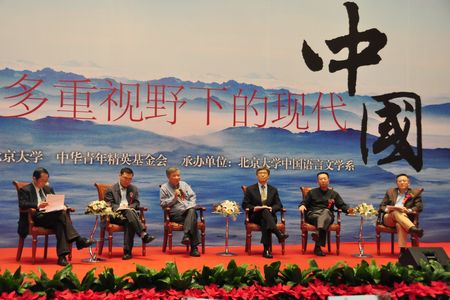Peking University, May 20, 2011: “Besides Revolution and Enlightenment, Expression of Emotion, though often neglected by most people, is also an important way to understand and explore literature,” said renowned scholar David Wang Der-wei.
He was speaking at the second "PKU Boya Forum" held on May 13 and 14 with the theme of “Modern China from Multiple Perspectives.”

The 2nd Boya Forum
Revolution, Enlightenment, and Expression of Emotion
David Wang Der-wei, Edward C. Henderson Professor of East Asian Languages and Cultures at Harvard University, spoke on the theme of "Revolution, Enlightenment, and Expression of Emotion" at the Boya Forum.
"There may be no one in the whole world who has read as many Chinese novels as Professor Wang,” said Chen Pingyuan, professor of the PKU Department of Chinese Language and Literature and the forum host.
Professor Wang started from the topic of "Enlightenment and Salvation," which was put forward by Li Zehou, a famous Chinese scholar of philosophy and intellectual history in the 1980s. However, Professor Wang went one step further. He tried to surpass the dialectic relationship between Enlightenment and Salvation and used a new tool - Expression of Emotion, to think about the interaction between literature and history.
"To some extent, Salvation and Enlightenment were the representation of Situation (Qingjing), Modality (Qingtai) and Mentality (Xinxing) in classical Chinese literature,” said Professor Wang. He thought people could read the history not only under the perspective of Enlightenment and Salvation but also that of the Expression of Emotion, which could better convey the thoughts in the past millennia.
According to Professor Wang, the essence of Enlightenment and Salvation changed with time. He emphasized that Enlightenment, Salvation and Expression of Emotion were not in an exclusive relationship. "History was complicated, so we need to explore, analyze, and understand it from multiple channels. Only by observing the interaction of these three can we better understand the crucial role of literature in launching, participating in, resisting, remembering, and surpassing the historical experience,” added Professor Wang.
After his speech, professors from the Department of Chinese Language and Literature gave their opinions on this topic in a discussion with Professor Wang. Professor Zhang Hui said that he was deeply inspired by his speech. “We should not only self-examine the modernity in itself, but also attach great importance to the intersection of ancient and modern, East and West.”
Urban Culture and Civil Society
The panel session of the forum with the theme of “Urban Culture and Civil Society” was held on May 14. Representatives from the Department of Chinese Language and Literature and the Department of History made speeches on the same theme from different aspects, such as close reading of texts, character analysis, and film literature. Students with different educational backgrounds joined the discussion, and several participants were from overseas such as the Republic of Korea and Malaysia.
The forum was sponsored by Peking University and the China Young Leaders Foundation.
About the Speaker:
David Wang Der-wei graduated from Taiwan University (NTU) in 1976 with a BA in foreign languages and literature, and went on to study comparative literature at the University of Wisconsin—Madison, receiving his MA in 1978 and his PhD in 1982.
Professor Wang was named as head of Columbia University's East Asian Languages and Cultures Department in 1997. In 2000, he succeeded Irene Bloom as chair of the University Committee on Asia and the Middle East. In September 2004, Harvard University named him Edward C. Henderson Professor of East Asian Languages and Cultures.
Extended Reading:
PKU Boya Forum on orientation of Chinese culture in globalization
Written by: Chen Meng
Edited by: Jacques
Source: PKU News (Chinese) and PKU Youth